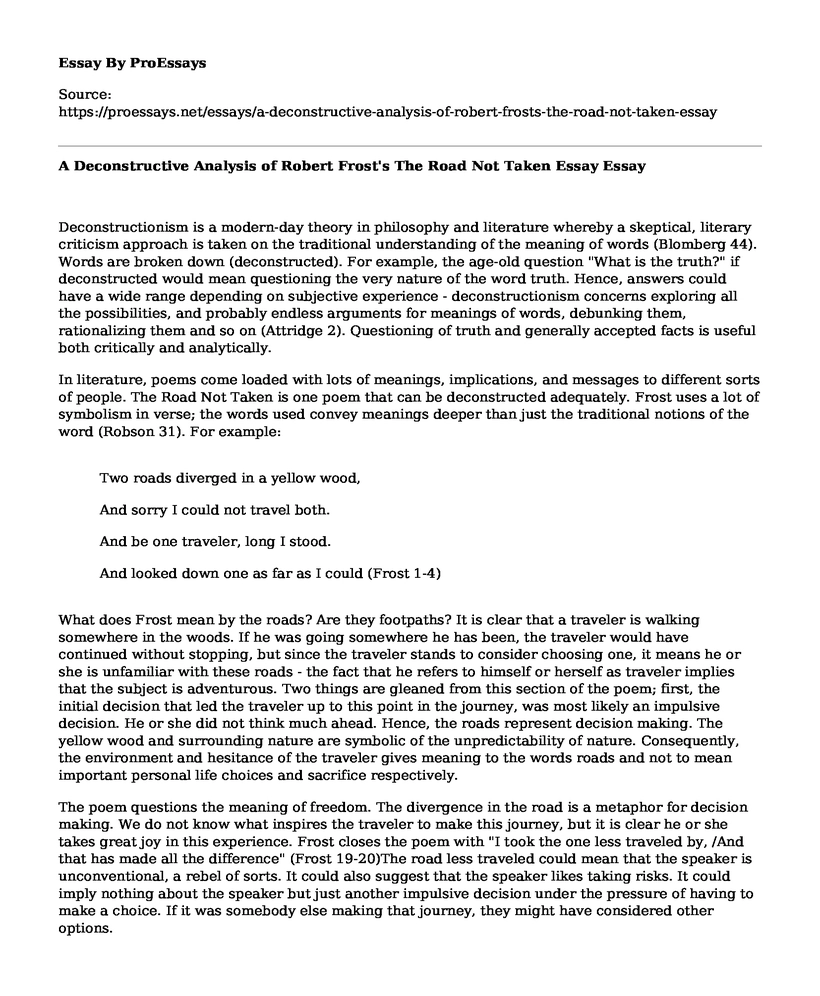Deconstructionism is a modern-day theory in philosophy and literature whereby a skeptical, literary criticism approach is taken on the traditional understanding of the meaning of words (Blomberg 44). Words are broken down (deconstructed). For example, the age-old question "What is the truth?" if deconstructed would mean questioning the very nature of the word truth. Hence, answers could have a wide range depending on subjective experience - deconstructionism concerns exploring all the possibilities, and probably endless arguments for meanings of words, debunking them, rationalizing them and so on (Attridge 2). Questioning of truth and generally accepted facts is useful both critically and analytically.
In literature, poems come loaded with lots of meanings, implications, and messages to different sorts of people. The Road Not Taken is one poem that can be deconstructed adequately. Frost uses a lot of symbolism in verse; the words used convey meanings deeper than just the traditional notions of the word (Robson 31). For example:
Two roads diverged in a yellow wood,
And sorry I could not travel both.
And be one traveler, long I stood.
And looked down one as far as I could (Frost 1-4)
What does Frost mean by the roads? Are they footpaths? It is clear that a traveler is walking somewhere in the woods. If he was going somewhere he has been, the traveler would have continued without stopping, but since the traveler stands to consider choosing one, it means he or she is unfamiliar with these roads - the fact that he refers to himself or herself as traveler implies that the subject is adventurous. Two things are gleaned from this section of the poem; first, the initial decision that led the traveler up to this point in the journey, was most likely an impulsive decision. He or she did not think much ahead. Hence, the roads represent decision making. The yellow wood and surrounding nature are symbolic of the unpredictability of nature. Consequently, the environment and hesitance of the traveler gives meaning to the words roads and not to mean important personal life choices and sacrifice respectively.
The poem questions the meaning of freedom. The divergence in the road is a metaphor for decision making. We do not know what inspires the traveler to make this journey, but it is clear he or she takes great joy in this experience. Frost closes the poem with "I took the one less traveled by, /And that has made all the difference" (Frost 19-20)The road less traveled could mean that the speaker is unconventional, a rebel of sorts. It could also suggest that the speaker likes taking risks. It could imply nothing about the speaker but just another impulsive decision under the pressure of having to make a choice. If it was somebody else making that journey, they might have considered other options.
According to the persona, there are two choices here, but the reader may deduce that there are more. The persona could turn back, or he could carve his path in the yellow wood if he is truly unconventional. The poem questions the nature of free will. If the persona has only two choices and has to make just one is freedom an illusion? Perhaps freedom means having choices but limited options.
Works Cited
Attridge, Derek. "Introduction: Derrida and the questioning of literature." Acts of literature. Routledge, 2017. 1-29.
Blomberg, Johan. "How can Linguistic Meaning be Grounded-in a Deconstructionist Semiotics?." Public Journal of Semiotics7.1 (2016): 43-58.
Frost, Robert. The road not taken. Shamrock Press, 1916.
Robson, Mark. "Defending poetry, or, is there an early modern aesthetic?." The new aestheticism. Manchester University Press, 2018.
Cite this page
A Deconstructive Analysis of Robert Frost's The Road Not Taken Essay. (2022, Oct 25). Retrieved from https://proessays.net/essays/a-deconstructive-analysis-of-robert-frosts-the-road-not-taken-essay
If you are the original author of this essay and no longer wish to have it published on the ProEssays website, please click below to request its removal:
- The Play King Lear Essay Example
- Contemporary Society as Depicted in George Orwells 1984
- Critical Essay on Lord of the Flies: A Societal Analysis
- An Analysis Essay on Industrialization's Effects on the Characters of Mary Barton
- Fate in The Iliad: Women & War Prizes - Essay Sample
- Essay Example on The American Dream: Success Through Hard Work and Sacrifice
- Free Report Sample: Romanticism/Transcendentalism Questions







